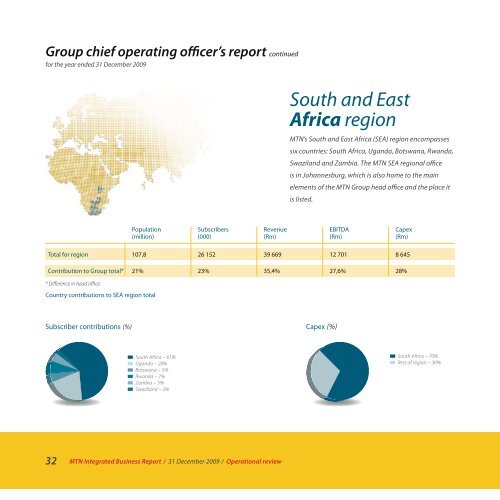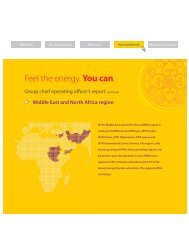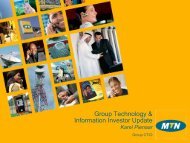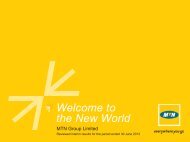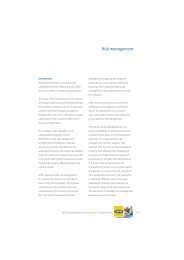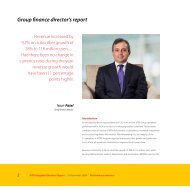South and East Africa region - MTN Group
South and East Africa region - MTN Group
South and East Africa region - MTN Group
You also want an ePaper? Increase the reach of your titles
YUMPU automatically turns print PDFs into web optimized ePapers that Google loves.
<strong>Group</strong> chief operating officer’s report continued<br />
for the year ended 31 December 2009<br />
<strong>South</strong> <strong>and</strong> <strong>East</strong><br />
<strong>Africa</strong> <strong>region</strong><br />
<strong>MTN</strong>’s <strong>South</strong> <strong>and</strong> <strong>East</strong> <strong>Africa</strong> (SEA) <strong>region</strong> encompasses<br />
six countries: <strong>South</strong> <strong>Africa</strong>, Ug<strong>and</strong>a, Botswana, Rw<strong>and</strong>a,<br />
Swazil<strong>and</strong> <strong>and</strong> Zambia. The <strong>MTN</strong> SEA <strong>region</strong>al office<br />
is in Johannesburg, which is also home to the main<br />
elements of the <strong>MTN</strong> <strong>Group</strong> head office <strong>and</strong> the place it<br />
is listed.<br />
Population<br />
(million)<br />
Subscribers<br />
(000)<br />
Revenue<br />
(Rm)<br />
EBITDA<br />
(Rm)<br />
Capex<br />
(Rm)<br />
Total for <strong>region</strong> 107,8 26 152 39 669 12 701 8 645<br />
Contribution to <strong>Group</strong> total* 21% 23% 35,4% 27,6% 28%<br />
* Difference in head office.<br />
Country contributions to SEA <strong>region</strong> total<br />
Subscriber contributions (%)<br />
Capex (%)<br />
n <strong>South</strong> <strong>Africa</strong> – 61%<br />
n Ug<strong>and</strong>a – 20%<br />
n Botswana – 5%<br />
n Rw<strong>and</strong>a – 7%<br />
n Zambia – 5%<br />
n Swazil<strong>and</strong> – 2%<br />
n <strong>South</strong> <strong>Africa</strong> – 70%<br />
n Rest of <strong>region</strong> – 30%<br />
32 <strong>MTN</strong> Integrated Business Report ⁄ 31 December 2009 ⁄ Operational review
Sustainability review<br />
Operational review <strong>Group</strong> overview<br />
Business review<br />
Operational review<br />
33 <strong>MTN</strong> Integrated Business Report ⁄ 31 December 2009 ⁄ Operational review
<strong>Group</strong> chief operating officer’s report continued<br />
for the year ended 31 December 2009<br />
<strong>South</strong> <strong>and</strong> <strong>East</strong> <strong>Africa</strong> <strong>region</strong> continued<br />
Performance<br />
The launch <strong>and</strong> enthusiastic take-up of money transfers via<br />
<strong>MTN</strong> Mobile Money in Ug<strong>and</strong>a was one of the key highlights<br />
of the <strong>region</strong>. Strong subscriber growth, infrastructure roll out<br />
<strong>and</strong> improved market positioning, particularly in Ug<strong>and</strong>a also<br />
punctuated the performance in the smaller countries. However,<br />
the first prolonged contraction in <strong>South</strong> <strong>Africa</strong>n economic activity<br />
since <strong>MTN</strong> started operating 15 years ago squeezed consumers,<br />
<strong>and</strong> together with the implementation of a new regulatory<br />
requirement to register all customers’ identity details (the so-called<br />
RICA process) in the second half of the year, put pressure on<br />
subscriber numbers in the <strong>region</strong>’s biggest market.<br />
Overall, SEA subscriptions exp<strong>and</strong>ed 8,8% to 26,2 million, led<br />
by good growth in Zambia, Rw<strong>and</strong>a, Ug<strong>and</strong>a, Botswana <strong>and</strong><br />
Swazil<strong>and</strong> (in order of each country’s percentage growth<br />
contribution). These were offset by a fall in user numbers in <strong>South</strong><br />
<strong>Africa</strong> due to the economic slowdown, the effect of RICA <strong>and</strong><br />
exacerbated by IT system problems (the details of which appear in<br />
a separate country report on page 36).<br />
Average revenue per user per month fell across the <strong>region</strong>, by<br />
between USD1 <strong>and</strong> USD4,50. This was in line with increased<br />
mobile penetration, which ranges between 19% <strong>and</strong> more than<br />
100% in the six SEA markets, as well as greater competitor activity.<br />
Half the <strong>MTN</strong> markets in <strong>South</strong> <strong>and</strong> <strong>East</strong> <strong>Africa</strong> have mobile<br />
penetration rates still below 50%.<br />
In line with the <strong>Group</strong>’s increased focus on data, <strong>MTN</strong> <strong>South</strong> <strong>Africa</strong><br />
successfully integrated Verizon <strong>South</strong> <strong>Africa</strong> (Proprietary) Limited<br />
with <strong>MTN</strong> Network Solutions to launch <strong>MTN</strong> Business in 2009. With<br />
nearly a quarter of the data market in <strong>South</strong> <strong>Africa</strong>, the operation<br />
is working on opportunities to extend its services throughout the<br />
<strong>Africa</strong>n continent.<br />
In <strong>East</strong> <strong>Africa</strong> in 2009, <strong>MTN</strong> strengthened its position despite<br />
widespread deregulation of the industry in recent years, increasing<br />
competition <strong>and</strong> significant declines in tariffs. Continued<br />
investment in the network, together with the launch of innovative<br />
products <strong>and</strong> a revamp of <strong>MTN</strong>’s distribution model in Ug<strong>and</strong>a <strong>and</strong><br />
Rw<strong>and</strong>a, led to a solid increase in customer numbers.<br />
In the year, <strong>MTN</strong> invested R8,65 billion of capital in SEA, up from<br />
R7,35 billion in 2008. In <strong>South</strong> <strong>Africa</strong>, more than 1 000 base<br />
transceiver stations came on air in the year – the largest network<br />
roll out in this market in eight years, making the <strong>South</strong> <strong>Africa</strong>n<br />
GSM network now one of the world’s most modern. In Rw<strong>and</strong>a,<br />
dem<strong>and</strong> increased significantly as prices declined. The network<br />
was able to h<strong>and</strong>le this thanks to the considerable investment<br />
made in providing additional coverage <strong>and</strong> capacity.<br />
In an effort to build market share through network quality<br />
improvements, in Ug<strong>and</strong>a <strong>MTN</strong> rolled out 436 BTS, up from 251 in<br />
2008, leading to substantial increases in network traffic. In March<br />
2009, <strong>MTN</strong> Ug<strong>and</strong>a launched Mobile Money, <strong>and</strong> by year-end had<br />
signed up 470 000 users, illustrating the scale of opportunity for<br />
this offering for the greater <strong>Group</strong>.<br />
A steep decline in the price of copper depressed economic<br />
activity in Zambia <strong>and</strong> led to a depreciation of the local currency<br />
<strong>and</strong> a drop in ARPU to USD7 from USD11 in 2008. Nevertheless,<br />
<strong>MTN</strong> Zambia’s new management team completed the roll out<br />
34 <strong>MTN</strong> Integrated Business Report ⁄ 31 December 2009 ⁄ Operational review
of the network, refined its distribution model <strong>and</strong> stepped up its<br />
promotional activity.<br />
<strong>MTN</strong> Swazil<strong>and</strong> recorded good subscriber growth despite a<br />
sluggish economy <strong>and</strong> high levels of unemployment. Swazil<strong>and</strong><br />
– along with <strong>South</strong> <strong>Africa</strong>, Rw<strong>and</strong>a <strong>and</strong> Ug<strong>and</strong>a – saw the soft<br />
launch of seamless roaming in the year. The service offers<br />
<strong>MTN</strong> prepaid customers the opportunity to enjoy their local rates<br />
<strong>and</strong> purchase airtime while roaming on other <strong>MTN</strong> networks.<br />
The launch of dynamic tariffing in Botswana in the middle of the<br />
year was well received by the market, with 525 000 customers – or<br />
some 40% of the subscriber base – taking up the offering. This<br />
helped counter the effect of a contraction in the economy related<br />
to the depressed dem<strong>and</strong> for diamonds, Botswana’s key export.<br />
To stimulate adoption by the market of data offerings, Mascom<br />
Botswana launched attractive data bundles. This boosted the<br />
increasing use of multiple SIM cards, contributing to an expansion<br />
in mobile penetration to more than 120%.<br />
Outlook<br />
Extending the provision of value-added products, including<br />
<strong>MTN</strong> Mobile Money <strong>and</strong> seamless roaming, as well as data services,<br />
will remain a focus for the SEA <strong>region</strong> in the year ahead. In Ug<strong>and</strong>a,<br />
the installation of 3G facilities will relieve congestion on the 2G<br />
network <strong>and</strong> facilitate greater data usage. Similarly, the <strong>Group</strong>’s<br />
access to various submarine fibre cables, <strong>and</strong> the recent launch of<br />
<strong>MTN</strong> Business, will boost overall data capabilities in the <strong>region</strong>.<br />
Some R6,1 billion has been earmarked for capital expenditure<br />
in the SEA <strong>region</strong> in 2010. This will be devoted to improving the<br />
quality <strong>and</strong> capacity of <strong>MTN</strong>’s network.<br />
<strong>MTN</strong> will continue to work to reduce environmental emissions<br />
from its sites, by further exploring alternative <strong>and</strong> renewable power<br />
supplies. It will build on recent gains in <strong>East</strong> <strong>Africa</strong>, where in 2009<br />
<strong>MTN</strong> rolled out a centralised fuel management system, making it<br />
easier to forecast necessary deliveries <strong>and</strong> monitor fuel use. The<br />
business also established hybrid stations with some reliance on<br />
solar power which means that surplus power at night is used to<br />
recharge batteries, <strong>and</strong> less power is then used during the day.<br />
Given the low level of mobile penetration in half of <strong>MTN</strong>’s SEA<br />
markets, the <strong>Group</strong> has increased its estimate for the size of the<br />
potential mobile market in five years’ time to 102,9 million, from<br />
a previous forecast of 96,6 million.<br />
Operational review<br />
Operational review Business review<br />
<strong>Group</strong> overview<br />
Sustainability review<br />
35 <strong>MTN</strong> Integrated Business Report ⁄ 31 December 2009 ⁄ Operational review


